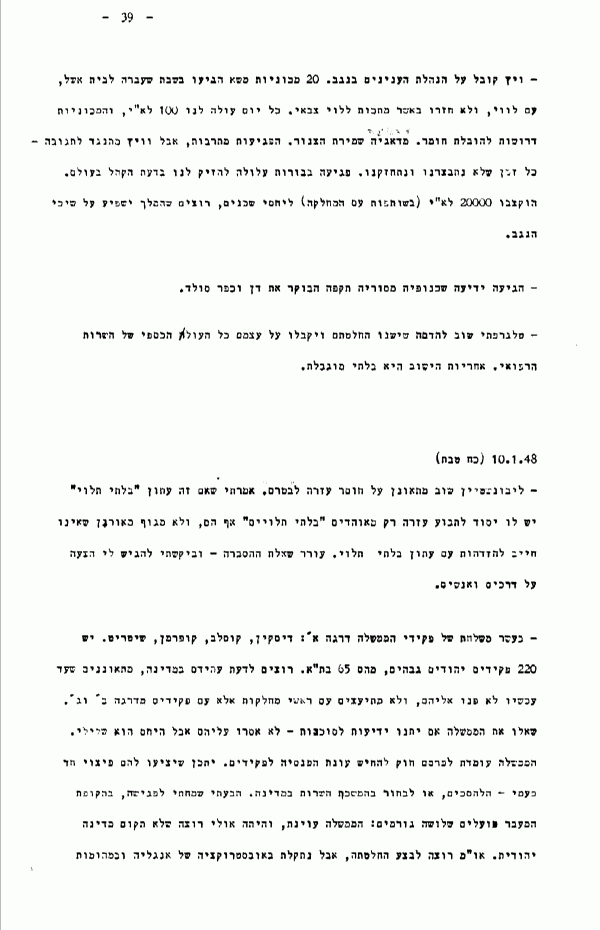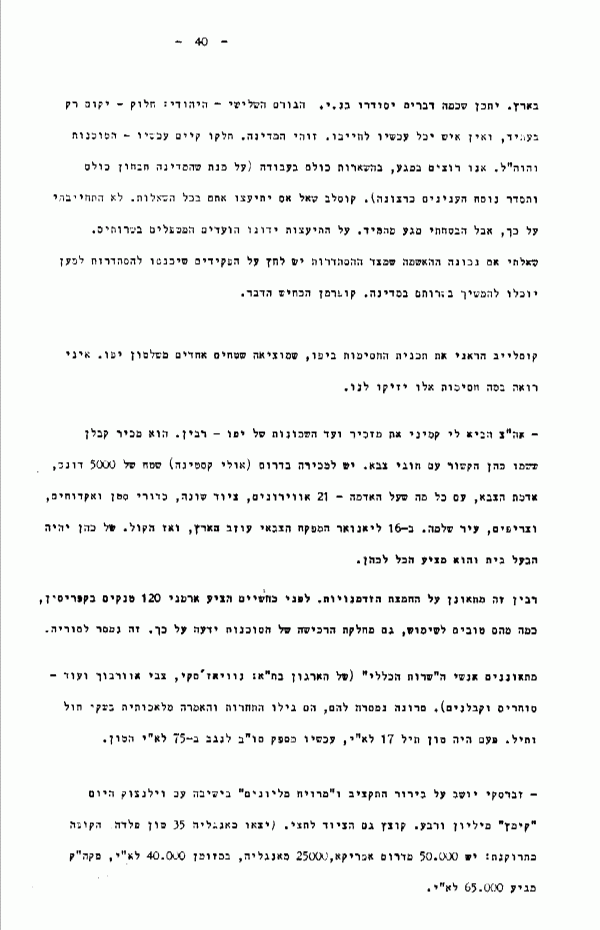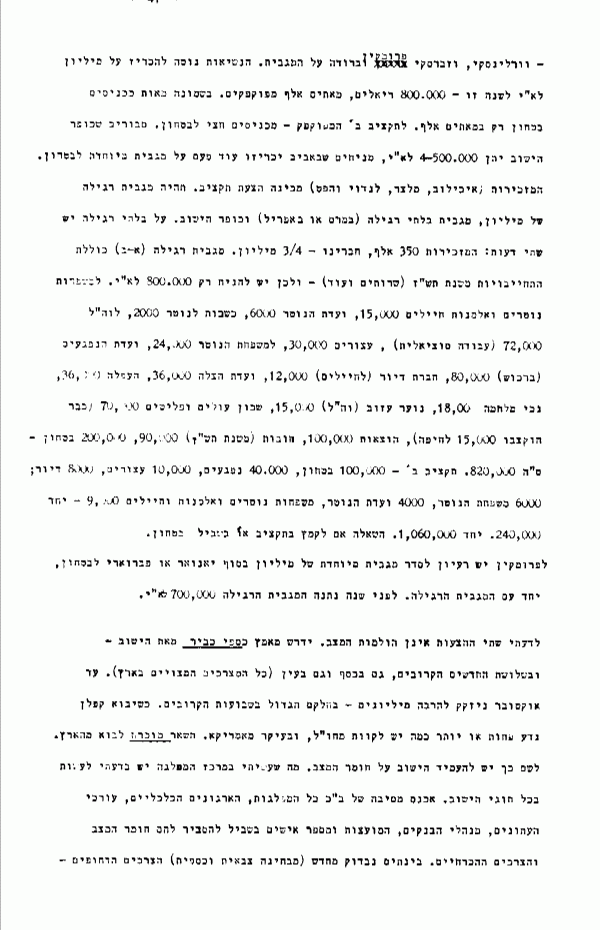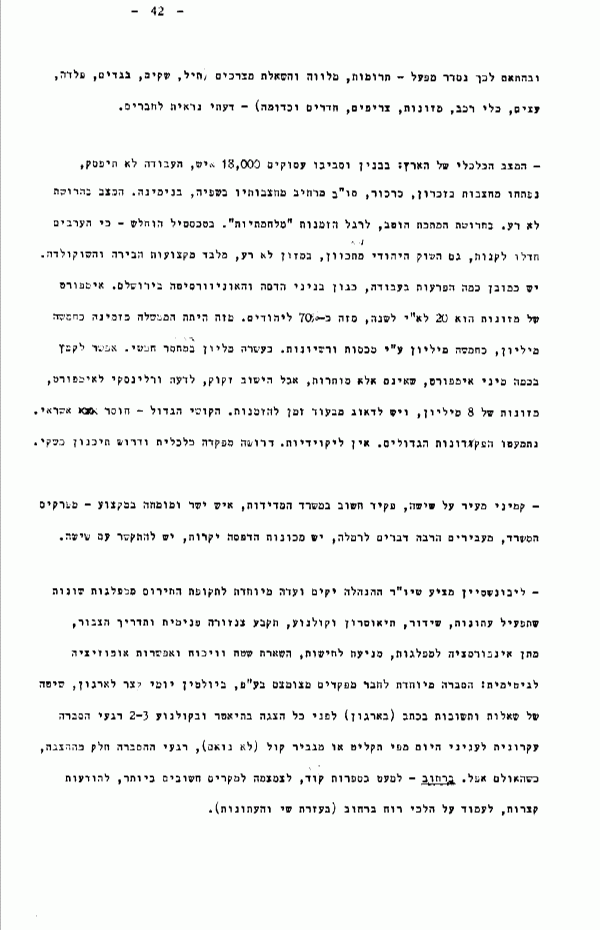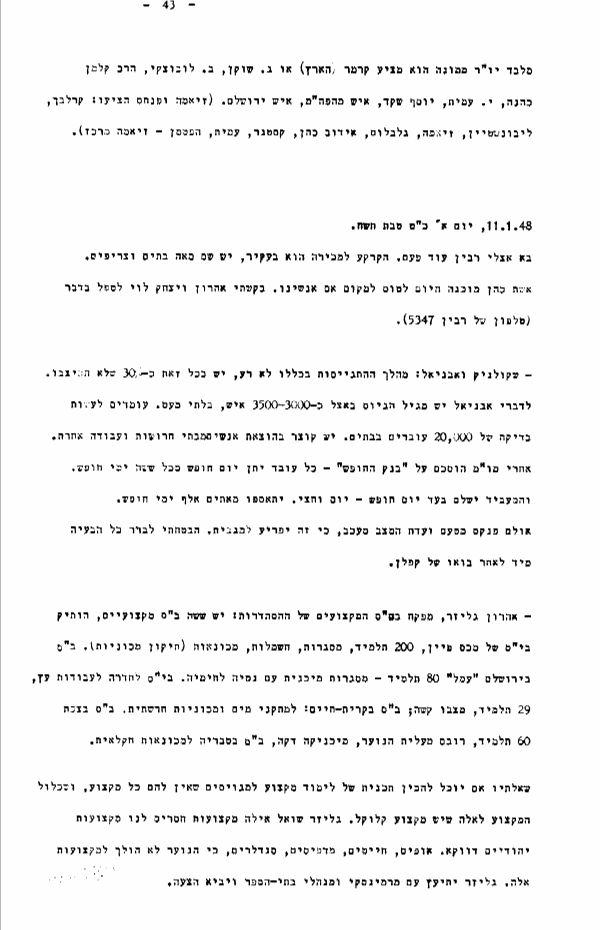1
of
Places:
England
New York
Jaffa
Sarona
Haifa
Jerusalem
Karkur
The use of the photograph is subject to the Copyright Law, 2007
10.01.1948
224818
{P001}[Saturday,] January 10, 1948 Liebenstein [Eliezer Livneh] is once again complaining about lack of assistance for Beterem. I said that if it’s an “independent” newspaper then he only has a basis for demanding assistance from supporters who are also “independent” and not from an organized body that is not obligated to identify with an independent newspaper. The question of hasbara [explanation, public relations] arose – and I asked to be presented with a proposal regarding methods and people. – At ten a delegation of [Mandatory] government officials, level 1: [Avraham] Diskin, [Yaakov] Kissilov [sp.], [Yosef] Kuperman [sp.], [Bechor] Sheetrit. There are 220 high-ranking Jewish officials, 65 of them in Tel Aviv. They want to know their future in the state. They complain that so far they haven’t been approached, and no one is consulting with department heads but instead with level-2 and -3 officials. [They] asked the government: “Will reports be given to the [Jewish] Agency?” – They weren’t prohibited from doing so, but the attitude is negative. The government is about to issue a law expediting pension season [retirement] for officials. They may be offered a one-time compensation. Should they accept, or choose to continue serving as part of the state? I expressed my pleasure at having the meeting. During the transition period three entities are at work: a hostile government, which perhaps doesn’t want a Jewish state to be established; the UN, [which] wants to implement its resolution but is encountering obstruction by England and because of riots in the country. It’s possible that a few things will be sorted out in New York [UN headquarters]. The third entity – the Jewish one: part of it – will only be established in the future, and no one can obligate it now. This is the quandary. Part of it exists now – the Agency [and the National Council]. We want contact, for everyone to remain at work (so that the state can assess everybody, and after that sort things out as it wishes). Kissilov asked whether they’ll be consulted on all the questions. I didn’t commit to this, but I did promise continuous contact. The committees that handle services [the subcommittees of the Situation Committee] will discuss consultation. I asked if there’s truth to the accusation that the Histadrut is pressuring officials to join the Histadrut in order to continue serving in the state. Kuperman denied this. Kissilov showed me the barricades plan in Jaffa, which removes a few territories from Jaffa’s governance. I don’t see how these barricades harm us. – In the afternoon [Avraham] Kamini brought me the secretary of the [Jewish] neighborhoods committee of Jaffa – Rabin. He knows a contractor named Cohen who has ties with army circles. There’s a territory of 5,000 dunams in the south (maybe Kastina) for sale, army land, with everything that’s on the land: 21 airplanes, various equipment, Sten bullets and guns, houses and barracks, an entire town. The army inspector is leaving the country on January 16, and then Cohen’s colonel will be the landlord, and he’s offering everything to Cohen. This Rabin is complaining about squandering the opportunity. Two months ago an Armenian offered 120 tanks in Cyprus, some of them suitable for use. The Agency’s Procurement Department also knew about them, and they went to Syria. – Members of the General Service (of the “Organization”) in Tel Aviv [which handled financial and administrative matters for the Haganah in the city]: [Yohel] Naviazhsky [sp.], Zvi Auerbach [sp.], and others – (merchants and contractors) are complaining: Sarona was given to them. They discovered that there’s competition and artificial [price] increases involving sandbags and barbed wire. At one time a ton of wire cost P£ 17, now Solel Boneh is providing it to the Negev at P£ 75 per ton. – Zabrasky is working on examining the budget and “making millions.” At a meeting with Vilenchuk today he “scrimped” one-and-a-quarter million. Equipment was also reduced by half (35 tons of steel left England). The account is emptying out: there’s 50,000 from South Africa, 25,000 from England, P£ 40,000 in cash, P£ 65,000 is coming from the KKL. – [Nahum] Warlinski [sp.], [Avraham] Zabrasky, [Heshel] Frumkin, [Isaac] Brodney [sp.] on the UJA: the board is inclined to announce P£ 1 million for this year. 800,000 [of this] is realistic, 200,000 is doubtful. The 800 [of the million] includes only 200,000 for security. For budget B – the doubtful one – half goes to security. They believe that Kofer ha-Yishuv [the Yishuv’s defense fund] will provide P£ 400,000-500,000. They expect to announce another special fundraising campaign for defense in the spring. The Secretariat ([Ezra] Ichilov, [Natan] Meltzer, [Michael] Landau [sp.], and [Avraham] Haft) is preparing a proposed budget. There will be a regular fundraising campaign of a million, an exceptional fundraising campaign (in March or April), and Kofer ha-Yishuv. Regarding the exceptional [fundraising campaign] there are two opinions: the Secretariat 350,000, our associates ¾ million. The regular fundraising campaign (A-B) includes a commitment from the [Jewish] year 5,707 [September 1946 – September 1947] (services, etc.) – and therefore we should only assume P£ 800,000. For the families of notrim [singular – noter, British-appointed auxiliary police] and widows of soldiers 15,000, the noter committee 6000, [?] for noter 2000, for the National Council [?] 72,000 (social work), detainees 30,000, the noter’s family 24,000, the (property) damages committee 80,000, housing company (for soldiers) 12,000, rescue committee 36,000, clandestine immigration 36,000, war disabled 18,000, abandoned youth (National Council [?]) 15,000, housing of immigrants and refugees 70,000 (15,000 already allocated for Haifa), expenses 100,000, debts (from the year 5,707 [1946-1947]) 90,000, 200,000 defense – total 820,000. Budget B – 100,000 defense, 40,000 wounded, 10,000 detainees, 8000 housing, 6000 the noter’s family, 4000 the noter committee, families of notrim and widows and [of?] soldiers 9,000 – in sum 240,000. In sum 1,060,000. The question is whether to reduce the budget or [make cuts] for defense. – [Heshel] Frumkin had the idea of organizing a special fundraising campaign for a million at the end of January or in February for defense, along with the regular fundraising campaign. A year ago the regular fundraising campaign yielded P£ 700,000. In my opinion, both proposals are unsuited to the situation. A tremendous financial effort will be required from the Yishuv – and over the coming three months – both in money and in kind (all the goods available in the country). By October we’ll need many millions – a majority of them in the coming weeks. When Kaplan arrives, we’ll know more or less how much we can hope for from abroad, and especially from America. The rest must come from the country. Towards this end the Yishuv must be made aware of the severity of the situation. What I did in the Party’s central committee has to be done, in my opinion, throughout all the Yishuv circles: I’ll convene a meeting of representatives from all the parties, the economic organizations, newspaper editors, bank managers, the councils, and a number of leading figures in order to explain to them the severity of the situation and the imperative needs. In the meantime we’ll re-examine the urgent needs (from a military and financial perspective) and accordingly organize a donations project, a loan, and [a system for] lending goods (barbed wire, sacks, clothes, steel, wood, vehicles, food supplies, barracks, rooms, and the like). My opinion was acceptable to the members. The country’s economic situation: 18,000 people are engaged in construction and related [work]. The work won’t end – quarries have been opened in Zikhron[-Ya’akov], Karkur; Solel Boneh is expanding its quarries in Shfeya, Binyamina. The situation in industry is not bad. The metals industry has improved, in light of “wartime” orders; in textiles it has weakened – because the Arabs stopped buying, [and] the Jewish market has also shrunk; in food it’s not bad, aside from the areas of beer and chocolate. There are of course some disruptions in work, such as in the buildings of Hadassah and the university in Jerusalem. Food imports are P£ 20 [million] per year, of which 70% is for Jews. Of this the government would order about five million, [and] about five million through rations and licenses. About ten million through free trade. It’s possible to scrimp on a few types of import, which are no more than luxuries, but in Warlinski’s opinion the Yishuv needs food imports of 8 million, and orders have to be seen to in advance. The main difficulty – lack of credit. The large deposits have shrunk. There’s no liquidity. There’s a need for an economic headquarters and market planning. – [Avraham] Kamini speaks of Shisheh [sp.], an important official in the Surveyor’s Office, an honest man and an expert in his field. [They’ve begun to] dismantle the office, transferring many things to Ramle. There are expensive printing presses. Need to contact Shisheh. – Liebenstein [Eliezer Livneh] proposes that the chairman of the Executive establish a special committee from the different parties for the duration of the state of emergency, which would operate the press, broadcasting, theater, and cinema. He called for domestic censorship and briefing of the public, provision of information to the parties, prevention of murmuring [while] allowing room for argument and the possibility of a legitimate opposition; special oral hasbara for a subgroup of commanders, a brief daily bulletin for the “Organization”; a format of written questions and answers (in the “Organization”); before any theater or cinema show two-three moments of hasbara principles regarding the matters of the day from a record or loudspeaker (not a lecturer); the hasbara moments would be part of the show, when the auditorium is dark. On the street – a reduction in wall literature [posters posted on walls, a common practice during the underground days], limiting it to the most important cases, short notices. To keep tabs on the moods in the streets (through SHAI and the press). Aside from an appointed chairman he proposes Kramer ([Dr. Moshe Keren] from Haaretz) or [Gershom] Schocken, B. Lubotzky [Binyamin Eliav], Rabbi Kelman Kahana, Ya’akov Amit, Yosef Shaked, someone from HaPo’el HaMizrachi, and someone from Jerusalem. Ziama [Aran] and Pinhas [Lavon] proposed: Ezriel Carlebach, Liebenstein, Ziama, [Aryeh] Gelblum, Idov Cohen, [Dr. Israel] Kastner, [Ya’akov] Amit, [Yosef] Haftman – Ziama as coordinator.





